Politics in the BioShock Franchise
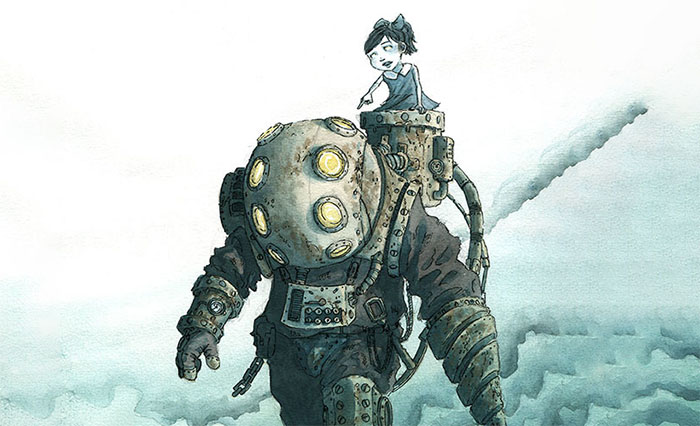
These games are, to some degree… If they’re about anything, they’re about not buying into a single point of view. About having a lack of confidence in anything. They’re not ever an attack on a single idea. It’s a bit of a plague on all your houses.
Ken Levine, Creator of the BioShock series
Of the games to enter the popular canon, few can really claim the impact that BioShock had in video games. The games were innovative and polished. The gameplay snappy and fun. The stories engrossing and compelling. But, when looking at the games, for their ideological merits, the cracks show almost immediately.
BioShock is a franchise of good games. Great games even. They’re fun to play and fun to replay. But, if one pays attention to the politics of the franchise, the handling of certain ideologies, the clumsy mishandling of others, and the ahistorical reduction of harm as framed by the player character, it is clear that the franchise while seeking to be political, has very little if anything of merit to really say.
Bioshock – Somewhere, under the sea

My philosophy, in essence, is the concept of man as a heroic being, with his own happiness as the moral purpose of his life, with productive achievement as his noblest activity, and reason as his only absolute.
Ayn Rand, Appendix to Atlas Shrugged“
To begin, Objectivism is a philosophy most politically aligned with Libertarianism but also Anarcho-Capitalism. It’s core tenets are self interest is the highest moral a man can achieve and its immoral for others to expect things of you. And it’s vehemently anti-government. Finding governments that are explicitly Libertarian is tricky in part due to the nature of the ideology to oppose government and thus not engage with it.
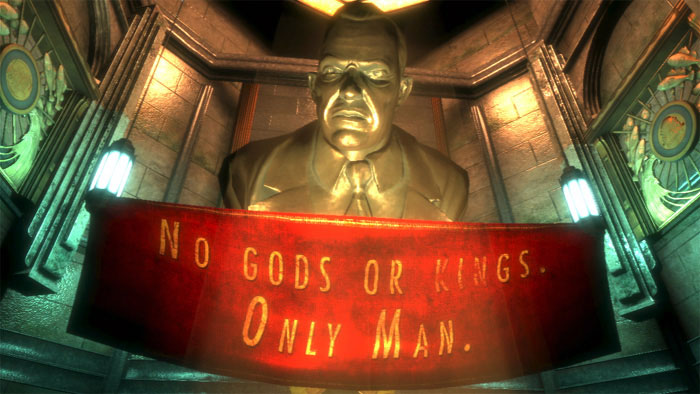
But despite that, at least in many Western nations, there has been a widespread acceptance of many of the Libertarian tenets such as the freeing of markets, cutting government spending. These traits have been most prominent utilized in another ideology, Neoliberalism. It is a bit more tolerant of the state but still carries many of the same goals as Libertarianism thus eliminating the need of true Libertarians as a centralized political force.
Despite that, there are a few townships and settlements to really judge Libertarianism by, and one of the best examples of the ideology in governance is the story of Grafton, New Hampshire. As reported by Vox in the article, “How a New Hampshire libertarian utopia was foiled by bears” there are clear examples of the kinds of flaws inherent to libertarian ideology. Grafton has became popular due to how the utopian Free Town Project ended with a town overrun by bears.
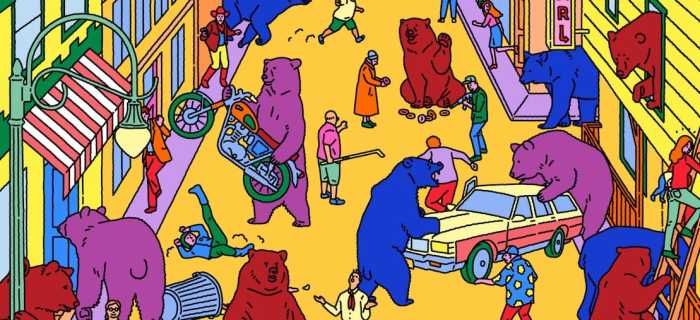
This story is relevant because of how its parallels with Rapture and how the central problem is the ideology of the people in power. By using the power of the state, they reduced the power of the state to do anything in the town to a point where no one wanted to live in it anymore because of all the myriad problems, such as the aforementioned bears. That is an example of the flaws in the ideology of Libertarianism.
Now this story is relevant because there’s an oft-repeated canard that BioShock is anti-capitalist in its framing and thematic presentation. Even those who might push back on that claim might still agree, at the very least its an Anti-Objectivist work and on the surface this can be seen as credible. But, at its core, BioShock doesn’t believe that Libertarianism is flawed or at least, it can’t be the only thing that causes the fall of Rapture.
The Fall of Rapture and Andrew Ryan
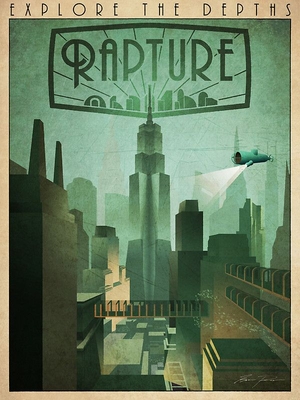
Rapture on the other hand, is failed not because of unregulated markets, or the cost cutting, or anything distinctly libertarian as a root. Far from it, as the despite all of the mistakes made, nothing really broke Rapture until ADAM and EVE.
Andrew Ryan, the leader and chief ideologue of Rapture is first encountered, not as enemy or an ally, but as a dominating presence, the first then you see as you enter rapture is a statue of him, with the banner of his maxim, “No Gods or Kings. Only Man.” How truly accurate to his style of governance this is, is a more dubious area of discussion but as an introduction to the character it conveys a clear sense that who ever Ryan is, his hand more than anything steers Rapture.
But that brings into contrast the meaning of the maxim. How can it be that Ryan can be this looming force and yet, yearns for the absence of a God or King. He himself being turned into a “golden idol” that if not meant to be worshipped is at minimum meant to be venerated.
The hypocrisy of Andrew Ryan not withstanding, the world of Rapture is the often theorized dystopian conclusion to libertarian ideology. That said, despite being set under the sea, the game’s approach to the philosophy is far less deep.
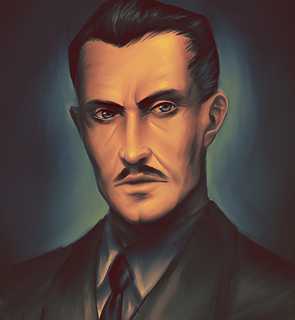
BioShock 1 doesn’t really feature Andrew Ryan as an objectivist or a libertarian. His a free market liberal definitely nd he has the slogans and the speeches but the narrative goes above and beyond to show he’s and out and out hypocrite.
Ryan had the power, changed when it was threatened, and the city collapsed into civil war. In his dealings with Fontaine, he uses the powers of state to absorb a company. To quote, John Robertson from Ars Technica,
If Ryan had been prepared to relinquish that power and allow objectivist ideas to truly flourish, then it’s possible Rapture could have continued unhindered. If there’s no power to fight against, then Fontaine would have had nothing to use as a galvanising force to cause Rapture’s population to rise up.
John Robertson
For all of his Randian talking points Ryan abandoned the ideology as soon as he wasn’t in total control. Some might see this as showing the true colors of his ideology but it doesn’t. Even in the creation of Rapture, he was the center piece so it wasn’t Artists being allowed, it was artists he liked, it wasn’t science being unmoored it was science he liked. While billionaires do have an outsized effect on policymaking, he wasn’t just the richest man in Rapture. He was the government. He ruled not out of competition and trust in the market, but self-effacing control. It is then not an objectivist leading to societal collapse. Instead, Ryan becomes a tin pot dictator seizing the properties of his opposition and refusing to cede control to the alternative.
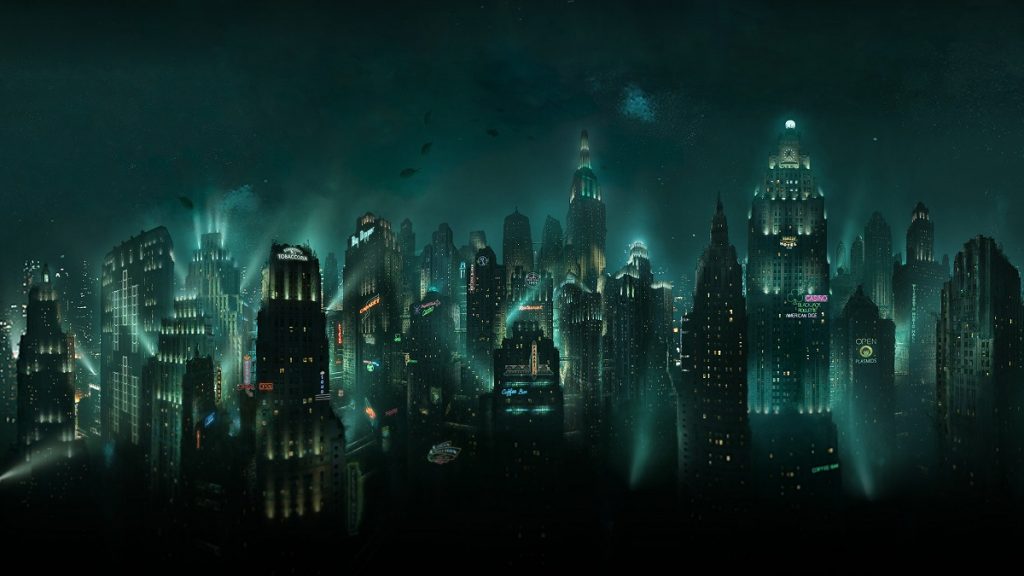
This behavior shifts the critique from “Objectivism is a bad ideology” to a “Power Corrupts” narrative. His ideology became less about the free market and more about preventing interlocuters from shifting his vision of Rapture, which may have had aspirations of being a libertarian wonderland but was never really given the chance to be.
For a critique to really be valid it must actually address the target. A strawman with a smattering of Objectivist slogans and catch-phrases does not an objectivist make.
There are plenty of actual, damning critiques of Objectivist philosophy, of Anarcho-Capitalist philosophy, of Libertarian philosophy and BioShock doesn’t even enter that realm. Tying back to earlier, Grafton’s problems, unlike Rapture’s were directly because of it’s ideological moorings. But the story and philosophy of the game isn’t how Libertarianism is not a good ideology, it’s that there’s no such thing as Utopia.
Understanding the Ideology of BioShock
The biggest problem with politics in video games, is that while ideologies are fluid and complex, for the sake of games and narratives, they must be flattened, simplified. Add in the pressures of AAA development where the explicit goal of games is to make as much money as possible, it becomes clearer why BioShock fails as a critique of a niche-philosophy extolling the virtues of greed and self-interest despite that ostensibly being the core of the game. The game instead chooses a more palatable conclusion with a patina of consequence for player choice.
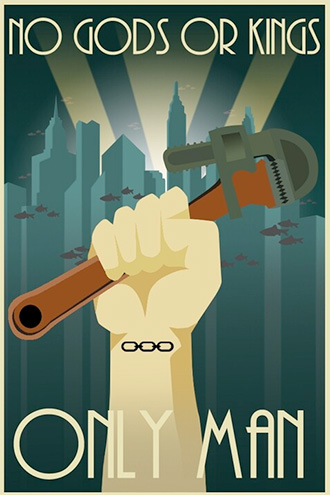
While Andrew Ryan’s espouses a world view of “No Gods, No Kings, Only Man” he’s shown to be quite the idealist. Many of the splicers were run of the mill normal folk before their unfortunate transformations, not members of his personality cult, not Randian supermen. Just people who heard of a town that was promised to be better than life on the surface.
Atlas, or Frank Fontaine is shown to be duplicitous and a subversive element in Rapture; A to Ryan. But importantly, he’s also better in the marketplace than Ryan. And when losing ground, Ryan immediately abandons his principles.
So, when a leader is shown to be a hypocrite, most people don’t become revolutionaries. In Rapture, it became a battle not of ideologies, or class, but of pure power. People supported Fontaine, not because Ryan was ideological impure, but because he was a dictator with a secret police force abusing his power. Fontaine, villain that he was, was still an alternative to what Ryan was offering.
Stripped of their ideological moorings, the antagonists of Rapture serve as little more than caricatures of the ideology. The lesson learned isn’t that Ryan was too much of a Libertarian, but instead, he wasn’t a true libertarian. His death, then becomes one of penance. He betrayed the god, the market, he espoused and he accepted his punishment, divine retribution in the form of Jack, the player character killing him.
The impact of the Little Sisters
A focal point of BioShock marketing and its legacy is player choice and lack there of. One of the more infamous elements was the implementation of the Little Sisters.
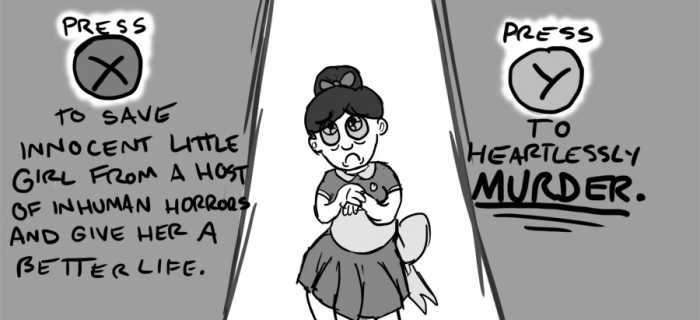
For the uninitiated, the Little Sisters within the narrative are exploited female children used for the cultivation of the games magical resource, ADAM. ADAM is how the player unlocks health upgrades, energy upgrades, not to mention the plasmid powers. The player in BioShock is often challenged via the little sisters to act in a moral but more challenging manner or an immoral but easier manner. Leigh Alexander put it best with, “did you want a lot of power, or a little.”
Except not really.
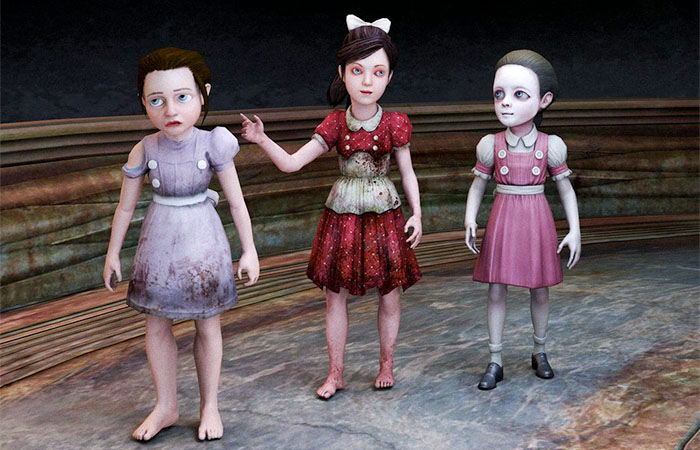
The game presents the dilemma as child murder for power or suffering for moral purity. But the suffering is highly overstated. As reported by Daniel Friedman,
…if the player chooses the rescue option, the Little Sisters leave a gift for every third child they save. Harvesting a Little Sister yields 160 ADAM, and saving her will only yield 80, but the gift contains 200. That means the difference between harvesting and saving Little Sisters only amounts to about 10 percent of the total amount of ADAM, and players who save the Little Sisters will still get all the upgrades they need as they play through the game.
Daniel Friedman
So the crux of the moral argument in the game isn’t one of power, but of characterization. You will get power either way, so what kind of character are you playing, a good guy or an actual murdering monster.
This contrasts the role of ADAM in the story as not only a scarce resource, but one of the chief contributing factors to the fall of Rapture. ADAM is stated to have mind-altering effects, enough to drive a person mad and yet. The player can at any point stop in game.
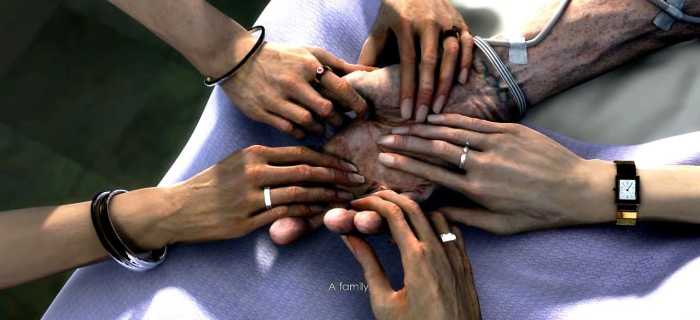
Your reward then becomes one of two ending animations. If you spared most of the Little Sisters, Jack adopts them and serves as a father and peacefully passes on with them at his bedside. If you harvest Little Sisters, Jack then emerges as the monster you played as along with presumably other splicers.
What does that say? What does it mean for the decisions, the much vaunted and celebrated morality quest of BioShock being little more than a role-playing decision between violent savior and violent monster. This aspect shows the hand of Bioshock. The agency of the player is still constrained and from those constraints, the worldview can be inferred. Don’t kill innocent people. Which is a decent moral for a young adult property but for a work seeming targeting a mature audience it’s more than a little underwhelming.
Now, it has been stated that this lack of ADAM scarcity was driven by executive concern for player interest, which could lead one to speculate about a theoretical BioShock, one that was more in line with the creator’s stated vision, but that game doesn’t really exist. The game that does exist is one where player agency doesn’t matter. Being a monster or a savior gives you a different ending but mechanically there’s no difference.
BioShock 2 – The Greater Good
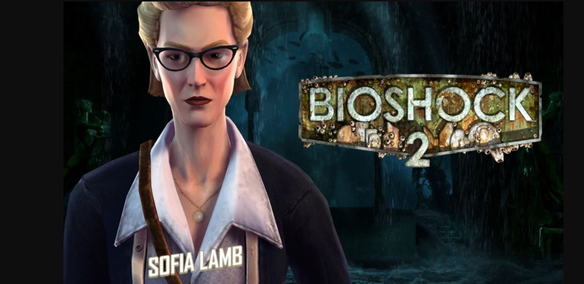
When you have not probed into a problem, into the present facts and its past history, and know nothing of its essentials, whatever you say about it will undoubtedly be nonsense.
Mao Tse-Tung, Oppose Book Worship
If BioShock 1 is understood as anti-objectivist, BioShock 2 is the reactionary response with a markedly anti-collectivist theme. But, it carries many of the same problems as its predecessor, namely it doesn’t really understand the ideology it wants to target.
Taking the role of villain in this case is Dr. Sofia Lamb, a direct inverse to Andrew Ryan from the previous. Where Ryan prioritized the individual as paramount, Lamb instead takes an altruistic utilitarian position of what ever causes the most good being the best option. Her ideology is doggedly anti-individualist in a way only seen in the most virulent anti-communist propaganda.
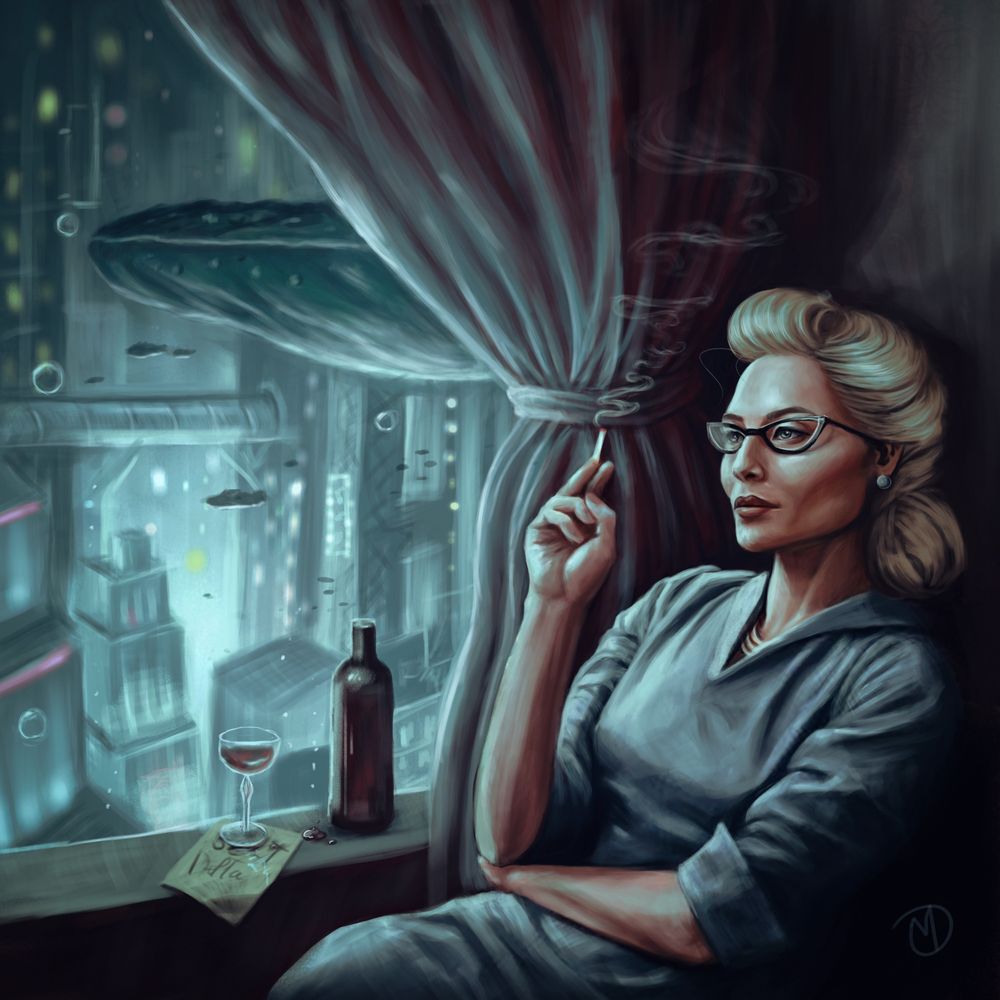
It’s important to note, Sofia Lamb was explicitly meant to be critical towards the left. It is was a stated goal of the developers. To quote from an interview done with creative director Jordan Thomas, “She[Lamb] is a very different thinker, based on John Stuart Mill and Karl Marx, and she is unwilling to allow any individual to compromise her plan.” But Lamb is no more a communist than any other character in the series. Lamb’s ideology lacks any sort of mention of class, or labor, or workers. She’s not particularly fond of the city of Rapture nor the surface. Her ideology is a mixture of Utopianism and Utilitarianism.
Criticism of collectivism is often comorbid with criticism of Communism and Socialism. But often, the criticism doesn’t really understand the ideology it wants to criticize. Bad criticism of communism is so common it is was made a joke of in the 1930s. “Of a thousand Socialists perhaps one has ever read a book of Marx’s, whilst of a thousand anti-Marxists not even one” wrote Nikolaievsky & Maenchen-Helfen, and it remains true even today.
And so yet again, the writers inability to grapple with the merits of an ideology whatever it may be, reduce the impact any critique may have.

That in mind, what is on display ideologically is the flaws of Utilitarian thought. Utilitarianism is another philosophy that has been absorbed into greater ideologies unlike those however, its proponents don’t necessarily follow one ideology. The central thesis of utilitarianism is that what causes the most good is the morally just action. It can be thought of as an ideology of the greater good and it has been invoked quite recently with the COVID-19 health precautions.
The idea of benefiting the most people is a consequentialist line of thought and thus leaves room for a lot of monstrous. What Sofia Lamb plans to do is create perfect people to make Utopia. She herself is more than willing to destroy anyone who gets in the way of her vision but her vision is one of the silliest and short sighted in the series.
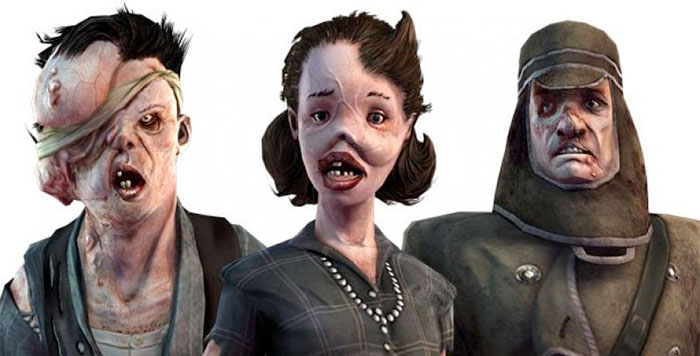
Splicers as they are shown in the world of BioShock are mentally ill. The effects of ADAM reduce them to dangerous and violent creatures of compulsion. These are not fertile lands to grow your paradise. Lamb knows this, her background is as a psychiatrist. She has seen first-hand how ADAM affects people. Even if one were to take an optimistic outlook on this, the in-universe understanding of ADAM undercuts her end goal. Her plan to turn her daughter Eleanor into a database of the brightest minds of rapture. Basically, a supercomputer with a utilitarianist outlook. Through the use of ADAM. Which will contain every evil thing done to or by the previous user.
Lamb’s plan to make Utopia makes no sense on its face.
BioShock Infinite – No seriously, Both sides are bad guys
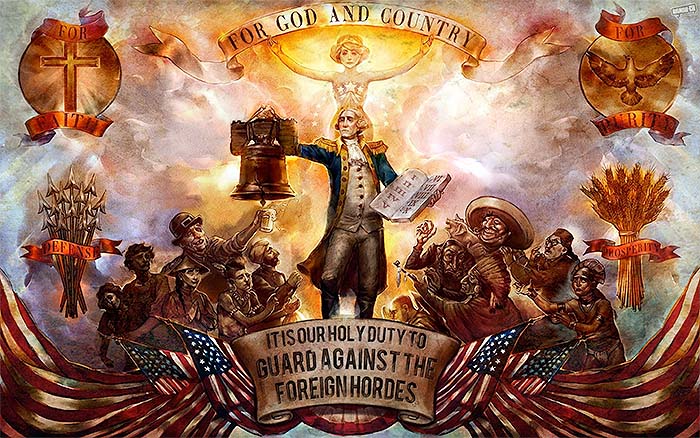
the wise man bowed his head solemnly and spoke: “theres actually zero difference between good & bad things. you imbecile…
Dril
A man asks you to throw a ball at an interracial couple, what do you do?
If you throw the ball you get a reward. If you don’t throw the ball you don’t. What do you do?
This is an example of the dilemma posed in BioShock: Infinite.
Video games are limited at times by the type of media they are. You can find games where you can be a hero or a villain and one thing BioShock Infinite wants you think about is that you’re playing a game. It leans on the walls of perception and does attempt to engage you meta textually. But it is still a game, and thus constrained by the the limitations of the media.
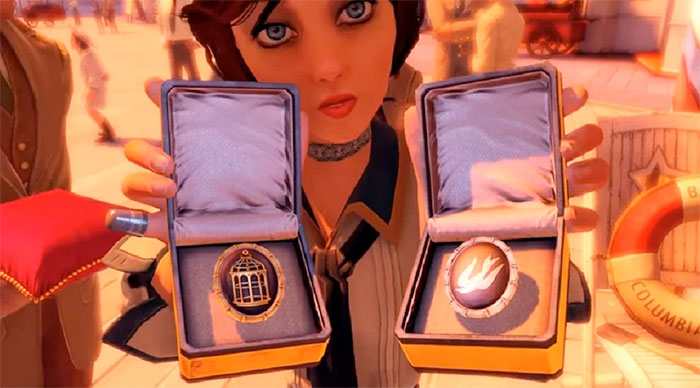
You can choose to throw the ball for example, you can aim at the racist or the interracial couple and you are only really punished for choosing not to engage. Your decisions in games are limited not just by by the technical capabilities of the media but also the world view of the developers. With that in mind, it is no exaggeration to say that BioShock: Infinite has some of the worst politics of any of the games.
Hail, Comstock!
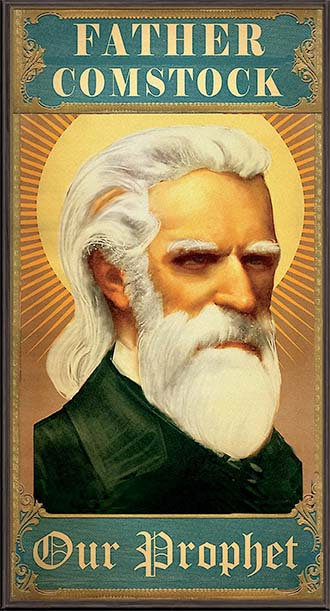
The chief antagonist for the majority of the game is one Zachary Comstock, who similar to Andrew Ryan created his own paradise. Here however isn’t one of unregulated capitalism and objectivist morality. In its place is pure, uncut, white supremacy.
Comstock’s Columbia is every bit the ugly history of America as a could be presented. It’s hammered home repeatedly, this is not a good society. Every black character is a slave. All minorities are ghettoized. There is a clear revulsion in the presentation of Comstock and his view of the world . To the game’s credit it understands how bad the racism of the past was. But the trick in the worldview of BioShock is that Comstock’s racism is of the past. It’s gone now. And to a point it could be argued that racism isn’t as overt now, but that is by design. As Lee Atwater famous speechwriter for President Nixon spoke at length about the strategy of disguising racism, of masking intentions. In his own words,
You start out in 1954 by saying, “N****r, n****r, n****r.” By 1968 you can’t say “n****r”—that hurts you, backfires. So you say stuff like, uh, forced busing, states’ rights, and all that stuff, and you’re getting so abstract. Now, you’re talking about cutting taxes, and all these things you’re talking about are totally economic things and a byproduct of them is, blacks get hurt worse than whites.… “We want to cut this,” is much more abstract than even the busing thing, uh, and a hell of a lot more abstract than “N****r, n****r.”
Lee Atwater
BioShock presents the world view of an outmoded racist as outmoded and to its credit it does treat him and his ilk with contempt. The game does him few favors both in characterization and in who he chose to associate with. Even the world he built in Columbia is shown to be a dystopia that only can continue to function with a caste of near slaves to prop up the lives of the white inhabitants. But Comstock’s repulsive world only really affects the player. Booker, the player avatar couldn’t really care less. He’s a selfish character for sure, but his real antipathy is evoked when encountering Daisy and the Vox.
Daisy Fitzroy, Vox, and The problem with Centrism
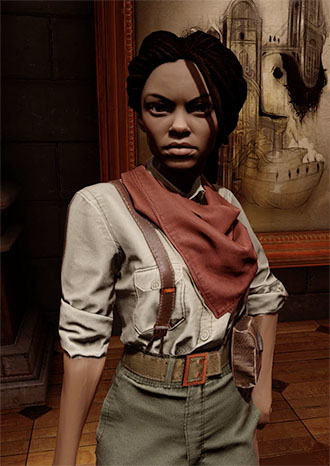
BioShock: Infinite’s true nadir with regards to politics is the handling of Daisy Fitzroy and the Vox Populi.
To explain, Vox Populi is a rebellion to the racist caste system of Columbia. Their ideology isn’t much explored outside of breaking the chains of their oppression. They are disparaged as “anarchists” but ideology outside of a worker’s struggle under segregation they’re not explicitly any ideology. No real reference to Kropotkin, Bakunin, Marx, Lenin or even the spectre of Stalin or the Soviets who would be as presence in this point in the time and are alluded to in the previous games.
The lack of an ideological mooring is at one point interesting as this game is very clear that it does have disdain for the ideology of Comstock. But the root of their lack of ideology ties back to the ideology of Ken Levine. Vox was in no small part inspired by West Germany Red Army Faction, a group often referred to as “terrorist” in nature.
With many West German institutions still under the control of those who had been in positions of power during the Nazi regime, an earnest protest group developed in open opposition to what it perceived as the fascist leanings of the government and its oppressive bourgeois values.
Game Informer – Columbia: A City Divided
The fact that West Germany was often governed by former Nazis and primarily existed as a bulwark to Soviet Union is a trifling concern because the Red Army Faction, became violent and fragmented and faded into history as many adventurist(read as: reckless) contingents of leftism often do.
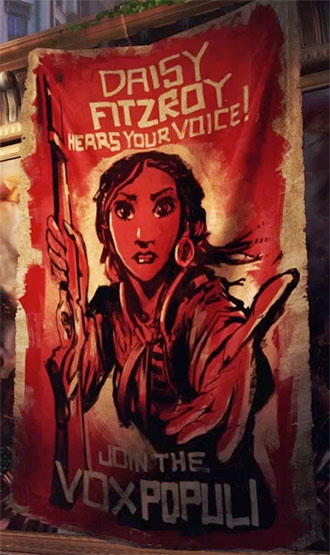
Daisy, the only named Black character in BioShock Infinite is met with contempt by Booker and Elizabeth. She is none to welcoming to Booker to begin, but throughout her interactions and encounters it is clear she is motivated not by power or greed, but because she’s a target for state oppression.
Booker, though never sympathizes with the Vox. He says that the only real difference between Fitzroy and Comstock is how you spell their name. And Elizabeth comes to agree.
And that’s just a galling claim.
Booker, is a noted war criminal. He, even before you take an action in the game, has engaged in horrific anti Indigenous and Chinese uprisings. The game acknowledges this, and then allows him an out for feeling bad. A great quote by Frankie Boyle explain the inhumanity of this, “Not only will America go to your country and kill all your people, they’ll come back twenty years later and make a movie about how killing your people made their soldiers feel sad.”
Comstock and his followers were racist and it is made clear in the game that is bad. What the game is unwilling to address however is however other character that was white, is complicit in the racism in Columbia. While some of the white progressives are willing to fight the for the rights of the minorities in the city, BioShock Infinite doesn’t really grasp the weight of the acts it is condemning. The narrative understands that racism is a bad thing, it understand that racism WAS a problem, but it doesn’t really understand how bad it is. How this level of apartheid, of segregation, of dehumanization affects people.
This is evident when Vox then takes the role of the antagonists in the game and Booker has no compunction about merciless killing throngs and throngs of them.
As pointed out by Venturefrog, writing for Timberowls, “Of all the characters who support the Vox, the only ones who are portrayed sympathetically in the end (Booker Dewitt, Cornelius Slate, and Preston Downs) are white”
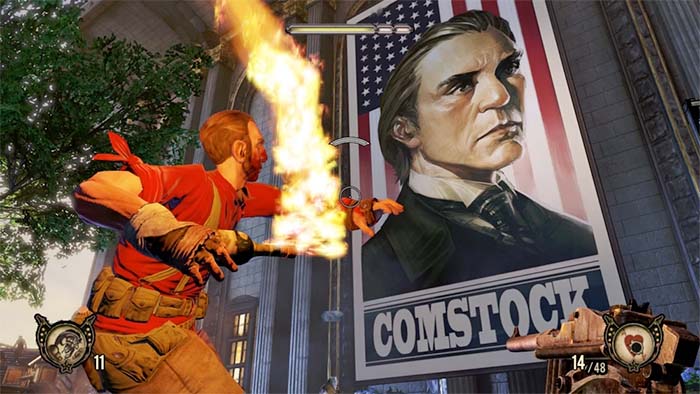
But that is the norm for the series, crystalline and pure where you are given Columbia, such a carnival of racism that would make even the actual founding fathers of America would blush. BioShock’s core message though is all good comes from the center. All power is bad power. So, even in a situation as clearly repugnant as Columbia the people fighting against systemic oppression, Vox, are presented not only as villainous, but just as bad as the openly racist, white supremacist society.
To clarify, Fitzroy’s biggest crime in the game is attempting kill to a child. An abhorrent crime that game’s additional story “Burial at Sea” attempts to lessen the impact of by revealing it was actually a trick to make Elizabeth a killer and able to save the day. Which, is a creative decision, but also one that muddles politics of the game’s world even more.
Much of the discussion about Daisy and Vox is centered from a white perspective, so to draw another real-life example. Haiti.
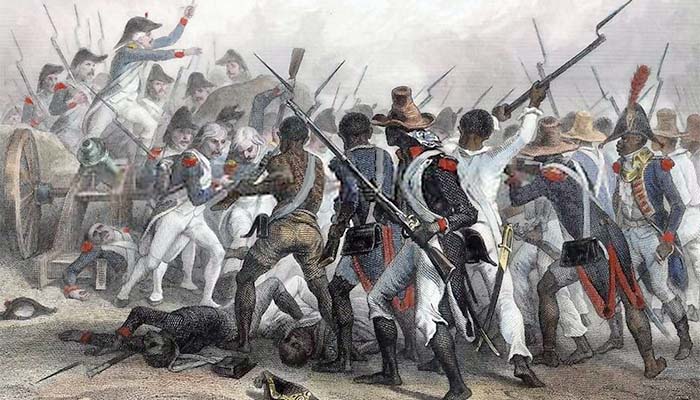
The Haitian Revolution was the first revolution to end slavery in the “New World” and the West hasn’t forgiven Haiti ever since. But during the revolution, the violent and bloody revolution to end the slavery of Black Haitians, people died. Some of whom it could be argued were “innocent”.
But what exactly should have been done? If hypothetically, the Haitian Revolution ended before any violent reprisal, what would be the consequence for the oppressed? Further oppression.
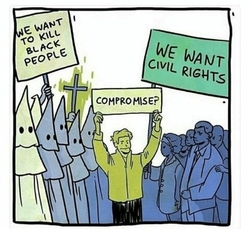
Centrism has a truly galling complex with regards to violence. For the status quo, violence is permissible if repugnant, but any and all violence that upsets said status quo is to be condemned in the harshest language.
Whether in Haiti, whether with the Black Panthers, whether with Mao’s China or Sankara’s Burkina Faso. No revolution that has a drop of blood is acceptable.
BioShock Infinite doesn’t care about the victims of racism, of chattel slavery, of immigration laws crafted to class a person as undesirable, permit their exploitation, and then deportation with no recourse.
The core message of the game is no matter what, no matter the justification. Both sides are bad.
A truly “Enlighted” addition to discourse.
Are you a bad enough dude to kill yourself?
Going back to the other key element of BioShock Infinite’s story is multiverse theory. The game presents the player character with the fact that Comstock is not just any villain, but actually a parallel universe version of Booker DeWitt.
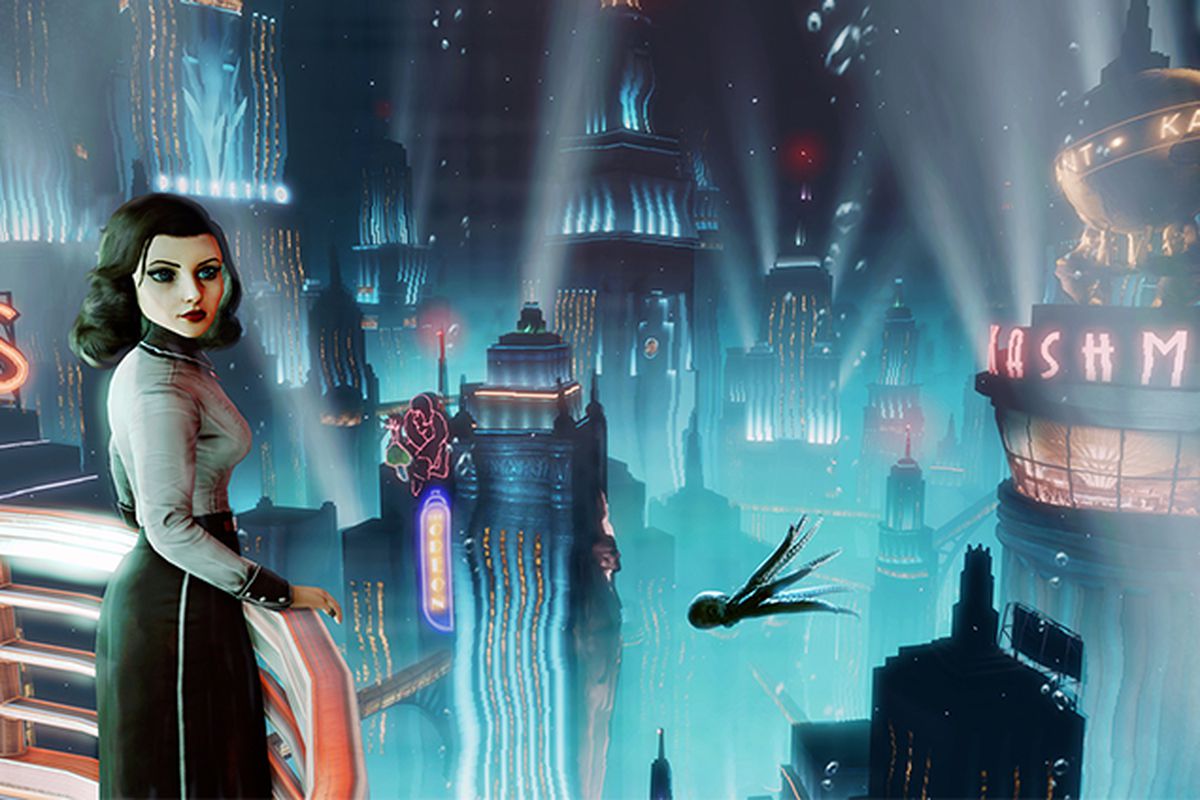
The player is then forced to die, being drown by the multi-versial incarnations of their adoptive daughter Elizabeth.
In a metaphorical sense the player is being asked to experience Ego Death. Which philosophically speaking is a curious area for games to examine.
But politically, it returns to the central conceit of the franchise, “Power is Bad”. Vox is redeemed in the DLC and turns out they weren’t all bad because Daisy just needed to be a sacrifice for the full actualization of Elizabeth, which is a decision.
In the end, provably the most power entity in the game world by being the player character, the writers had no real choice other than killing off the player character. For all the interest that could be peaked, it begins and ends in the same position as if you never played the game at all.
Thesis – Gamers hate politics, Anti-Thesis Gamers Love Politics, Synthesis: Gamers fear politics.
Sophie From Mars
Discussions of politics and philosophies with regards to games is positioning oneself as the metaphorical Damocles, for whom the sword is always waiting to drop. Harassment campaigns, death threats, and all manner of abuse follows this lane of discussion, and yet it’s a discussion that insists upon itself.
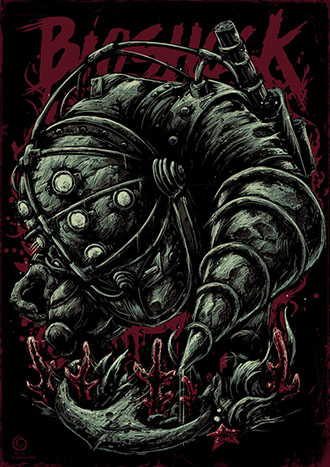
Games are a media and media carries messages. The themes of a story, the subtext, the decisions players make, the ones they’re even allowed to make, all of these are directed. Games, especially at the AAA level are never individual products. Teams of writers, developers, artists, designers, even quality assurance testers all play a part in getting the product ready for a successful launch.
When a video game does approach a political topic due to the incentives of the market, there’s a natural limit to not just the ideas that can be present and how they’re presented. When trying to appeal to the most players, as many AAA games do, politics often are just set dressing.
The BioShock franchise is thus another example of politics as an aesthetic choice. For all the questions posed both philosophically and ideologically, the games seem happy to avoid answering them or even actually dealing with them.
Works Cited
- Friedman, Daniel. “BioShock Bungled Its Best Chance to Make Play Meaningful.” Polygon, Polygon, 19 Sept. 2016, https://www.polygon.com/2016/9/19/12972940/bioshock-little-sisters-adam.
- Illing, Sean. “How a New Hampshire Libertarian Utopia Was Foiled by Bears.” Vox, Vox, 10 Dec. 2020, https://www.vox.com/policy-and-politics/21534416/free-state-project-new-hampshire-libertarians-matthew-hongoltz-hetling.
- Moe, Marius. “The Cult of Americanism .” Munin, The Artic University of Norway, 15 May 2022, https://munin.uit.no/bitstream/handle/10037/25767/thesis.pdf?sequence=2.
- Obubo, Daniel, et al. “The Metapolitics of BioShock Infinite.” Diggit Magazine, 17 May 2021, https://www.diggitmagazine.com/articles/metapolitics-bioshock-infinite.
- Robephiles. “‘BioShock’ and the Dangers of Centrism.” LevelSkip, LevelSkip, 16 Mar. 2019, https://levelskip.com/first-person-shooters/Bioshock-and-the-Dangers-of-Centrism.
- Robertson, John. “Why BioShock Still Has, and Will Always Have, Something to Say.” Ars Technica, 10 Aug. 2016, https://arstechnica.com/gaming/2016/08/bioshock-objectivism-philosophy-analysis/.
- Shaw, Daniel Odin. “Ideology in BioShock.” Press Start, 11 Mar. 2019, https://press-start.gla.ac.uk/index.php/press-start/article/view/77.
- Smith, Ed. “The Politics of ‘BioShock Infinite’ Are All the Worse When Revisited in a Heated Election Year.” VICE, 4 Oct. 2016, https://www.vice.com/en/article/exkvvk/the-politics-of-bioshock-infinite-are-all-the-worse-when-seen-in-a-heated-election-year-130.
- Ventcorefrog. “BioShock Infinite’s Modern Racism.” Timber Owls, 15 Dec. 2021, https://timberowlscom.wordpress.com/2018/05/14/bioshock-infinite-modern-racism/.
What do you think? Leave a comment.











I was disappointed with Bioshock. There is no denying that it was trying to be more than your average FPS shooter, and such ambition should be applauded, but I constantly felt that the gameplay decisions were in contradiction to any points that the narrative was trying to make.
Given that it was clearly trying to be an example of games as art it is unfortunate that many people still fail to analyse it in this perspective, merely talking about its source material and not whether the end result itself suceeds as an artistic statement.
What bioshock makes really clear is that every characters of the downfall of rapture are rational actors acting in their own self interest. The point of bioshock is that no matter the people the shining objectivist city on the hill will inevitably become rapture.
Objectivism simply cannot endure reality.
One of the most important part of commentary of bioshock are the little sister.
Children have no place in objectivist society they have no moral value. So they become a commodity.
I’d love to hear your opinions on the Freedom Force series (the games they made before Bioshock). They’re not great critiques but they at least have more teeth with their commentary. And while they’re not great games they can at least make me laugh from time to time.
To me, the thesis of the Bioshock series as a whole is not a refutation of specific ideologies, but that you shouldn’t try to create utopias out of ideologies, and you certainly shouldn’t be giving ultimate power to specific individuals to create those utopias.
Did you read my article? That’s bad.
Makes me wonder if a first-person shooter is somewhat limited in it’s ability to explore complex ideas as the interactions with the world are so limited.
One thing I will give Bioshock Infinite credit for is how it showed that even when “minorities” are given equal rights and the keys to the kingdom, they make the world uninhabitable for themselves and everyone around them. I also found the games commentary on immigration accurate and enlightening (as proven by European countires) that when you allow people from different cultures and ethnic groups into your flourishing civilization, they try to tear it down.
You praise that!?
Oh you’re just a super racist. Like boy, did you read this article?
Bioshock Infinite: the American Evangelicalism simulator.
American Lebensraum
Bioshock story of nationalism it’s very relevant to modern day.
Nah.
Infinite was supposed to be centered around the vox populi vs the founders after father Comstocks death. if it had stuck with that and left that “ending” out of it, I think it would have been way better. Just on a personal note I don’t like infinite as much as bioshock 1 or even 2. Infinite should have been it’s own thing.
As a student of history, I think that a society functions best when there is a common understanding about how patriotism (which emphasizes achievement in spite of a nation’s flaws) and nationalism (which refuses to acknowledges a nation’s flaws and pretends that a nation is infallible) are different things, and the former is more desirable, while the latter tends to lead to destruction!
In Bioshock 2, Sofia Lamb thought that she could built a real life Utopian place, based on the comum good. The literial anthises of Rand’s line of thought, show equelity as hamful. Seriously, Bioshock 2 is better then people given credit to it.
It’s not. It’s lazy anti-Com argument that would’ve been better forgotten.
Loved the atmosphere of Bioshock. Very different from most other games.
Bioshock 1 was one of the best games I’ve played. Bioshock 2 was not.
I guess.
Unfortunately, with Bioshock Infinite, Irrational pieced together an intricate, mouth-watering delicacy only to smother it with lumpy warmed-over FPS custard.
Astonishing opening, astounding close – but by and large the 90% of the game in between ultimately proved an underwhelming slog. The game’s bold ideas and ambitions deserved some other showcase, one that was not straitjacketed by traditional AAA aspirations and expectations.
Levine is one of the best developers of the last twenty years. System Shock. Freedom Force. Thief. Bioshock. All phenomenal achievements.
Lol.
What Bioshsock did brilliantly is that it does not have a distinct message. It does not moralize anything it mereley aims at creating a simulation. The central mechanic arround the decicion to either harvest or free the little sisters is never condemned by the game, nor are you punished for doing so. They are just two different options you are free to explore. The game even acknowledges that a crude drive for mere power will in fact give you power. If you decide to simple reap them you are in fact rewarded by disposing of all your enemies (including ryan and fontaine) and take charge of the city, with the ending scene implying that you will launch an attack on the surface by capturing a submarine with nuclear weapons. No moral grandstanding no show of how bad a person you are. It merely lets things play out following the parameters they set for this simulation.
Didn’t read the article.
I did. 😊 Was just giving an info dump of my general thoughts about the game…
My problem with Bioshock is it’s story is such a superficial critique of Rand but it’s also such a superficial spiritual remake of System Shock 2.
It’s not helped that they felt the need to shoehorn the plot twist from SS2 into the game which informs most the story. Plus they felt the need to shoehorn in so many superficial elements from the previous game. It undermines the critique and only serves to show the game is just an inferior version of SS2.
Thank you for the comment. I do think it was trying to do too many things at once.
The series has always been about cultism of utopian ideas and how our humanity corrupts good intentions. The left and right wings are both cults, each rejecting reality for their own images as to what is happening and morally correct. I always encourage reading and learning from all because the more ideas you have, the more balanced perspective you can obtain.
Both sides bad. Simplistic thinking. How many communists have you actually read?
These are interesting points when it comes to Bioshock. Thank you.
Thank you for the feedback.
Great stuff. I shared your article with my daughter who has been a big fan of BioShock from the beginning and when she described it to me a few years ago, it sounded like so much more like a grand epic worthy of a cable series and the storylines pulled me in.
I freaking love bioshock, it made me fall in love with science fiction and George Orwell larger then life. Social constructs and questioning are own moral systems and psychologie.
Bioshock made you like Orwell?
Well libertarianism is good on paper but I doubt they’ll ever be a feasible system.
Is it even good on paper though?
It’s not even good on paper. That’s the whole point of the game.
The point of the game is that when government overstep their bounds and go directly against the ideas the city it’s build on things start to fall apart. It’s essentially “Government Bad” the game.
lol that’s one way to look at it.
The creator of this video literally said you can’t blame libertarianism for the fall of Rapture… because that’s a dumb argument.
The game kinda concludes the complete opposite – the abandonment of libertarian principles of objectivity and the embrace of altruist government led to Rapture’s eventual doom.
Yes.
Reading of Bioshock as political statement is misplaced and misses the point of the game entirely. An easy case can be made that Bioshock fundamentally represents what happens when ideology and political orthodoyx clash with the messiness of reality and human society.
The main thing this work of art tries to do is provide simulations the player can experience for themselfs. Within that the core mechanic focuses on agency and ethics, not political ideas.
hard disagree.
While i don’t think i 100% agree with your points in their entirety (i don’t have a lot of time to get into it right now), it’s great to learn different takes on the franchise as being a huge fan of it i have quite a high opinion on it, so these kinds of articles broaden my opinions and how i view the games itself.
I’d love to hear some feedback whenever.
I’m also a fan of the games. I love games that give me stuff to analyze them.
If Bioshock infinite was made now it would be accused of pushing left wing agenda.
?????
For real. Fox News would prolly try to get it banned like they did in 2012 wit the Lorax movie, they claimed it was teaching “liberal propaganda” to children, when it was teaching children to care for their environment, how is that “liberal propaganda” let alone a bad thing? Humans are causing so much damage to the environment n the right doesn’t see it as a problem n call it a “hoax”.
Wouldnt the Vox be compared to blm?
more like ANTIFA lol.
I’ve actually never played Bioshock myself, but I do think that the subject matter you discuss is very interesting and informative. All I can say now is that I better starting checking out Bioshock for myself.
It’s a fun franchise.
Bioshock Infinite is my favorite first-person linear video game.
Eh, Doom is better.
Bioshock and USA. Two side one coin.
I haven’t played BioShock, but am I the only one whose probably predicting that the second Civil War could happen in real life like what happened in the game?
Not like in the game.
Crazy that what is effectively a playable critique of Atlas Shrugged reached such popularity.
Atlas Shrugged FPS
I’m actually a huge Ayn Rand fan (I’m all for the objectivism philosophy – just toning down some of the more radical ideas) and still LOVE the Bioshock franchise! It’s my absolute favorite.
Lol, whilde to admit this.
Bioshock is not even an attack on Ayn Rand. Ken Levine (the creator of the game) said it himself. His criticism of Rand’s philosophy isn’t that it’s an evil ideology or anything. His criticism is that it requires perfect people to carry it out. So he created a story full of fallible characters who don’t follow the philosophy through and through. Everyone in Rapture is a hypocrite, especially Andrew Ryan.
The rich folk coercing law to enjoy full privilege, never heard of that.
lol facts.
This was a fantastic read with some great observations on the politics in Bioshock. I honestly didn’t think much of the politics when I did my play-through of the games nor did I care for it since I was too busy shooting crows out of my hands and drilling fools in the chest haha!
Fair. I think most people fall into that area.
I have not yet read the article, saving it for the weekend. But I have skimmed through the comment threads. The funny thing is that Bioshock could have been turned into an effective (if heavyhanded) satire of Objectivism with one simple change to the cause of Rapture’s decline.
Rapture, as we see it in Bioshock, fell due to moral degradation: unchecked ambition, perverse artistry, unrestrained violence… the usual culprits of “societal decline” rooted in some inherent flaws of humankind. Many of the villains in Bioshock more accurately resemble the intellectuals and artists that she (and by extension, fascists) despised than actual critiques of Rand’s ideas themselves.
I suppose you could say that, despite promoting a logical and concrete society, Rapture’s citizens quickly gave way to the emotions and desires that they attempted to suppress. But what I would have done was have Rapture decline simply because nobody was around maintain the damn place. In the highfalutin paradise of Galt’s Gulch/Rapture, a lack of menial labor to keep basic functions working would swiftly send its citizens into a death spiral. Everything from unclogging pipes (hah) to wiping down phones would go understaffed or neglected entirely, and the denizens of Rapture would degrade due to their own misguided understanding of human emotion.
I believe Douglas Adams actually made this exact jab at Rand somewhere in the Hitchhiker’s Guide series, but I’ve admittedly only read the first book. Correct me if I’m forgetting how Rapture addressed its menial labor problem. The Little Sisters didn’t do that, did they? What even are the Little Sisters to the critique of Rand? Part of me wants to believe that Rand’s work isn’t even substantial enough to satire or even acknowledge to this degree, but it’s still something that must be done considering how influential the woman is today.
Bioshock is a series I hold closely due to the nostalgia of playing each game throughout my childhood. Looking back at it as an adult, the political topics and theories, especially of Bioshock Infinite, really resonate with discussions and lessons covered in my college courses.
Not only is the storytelling engaging, but Bioshock prompts you to seek it out yourself. Along the novel that serves as a prequel to the first entry, the audio logs provide so much story either before or present at the time of playing.
Personally, I enjoy games that provide political and even philosophical topics while maintaining themselves as a game that doesn’t rely on either to be playable. This is precisely what Bioshock does, and it’s done wonderfully.
Incredible article! I absolutely love the Bioshock franchise. Infinite did disappoint me but the politics always stayed interesting.
Interesting read, the older I get the more I want to delve into Infinite’s politics as those seem to cause controversy.
Great read! Bioshock especially Infinite will always have a place in my heart.
This could have used a proofread,
I think the arguments against Bioshock’s critique of libertarianism are less about the ideas (that aren’t great) and more how the people that adhere to that ideology won’t adhere to their supposed principles the moment they are inconvenient.
Then it’s not a critique of Libertarianism.
first of all, marvellously researched piece, you understood and critiqued the core ideologies that Bioshock explore splendidly.
But I would like to say that though It is true, that Bioshock elicits a lot of questions than answers when it comes to the ideologies it explores, I would like to argue, perhaps that is the point, to question these repetitive and harmful ideologies of creating a utopia without understanding that there is no such thing as a utopia for one without it becoming dystopia for another. Asking these questions of how badly the system is corrupt and that it needs to be addressed is what Bioshock highlights in its game.
I disagree with your presupposition that a utopia must come from another’s dystopia. I believe that is another element of “capitalist realism” where people can’t imagine a world without the exploitation of another person. That it’s easier to imagine the end of the world than the end of capitalism.
I’m not a utopian though.
I was a late-bloomer, Bioshock was my first ever videogame. I remember it being very difficult to find a game that could live up to its story after my first play through. This is a really great article, a very well thought out piece!
It was not my first game ever, but one of the first ones I’ve played. Really good written article, writer get to point
Thank you.
I think Bioshock is proof that Ayn Rand’s philosophy isn’t working.